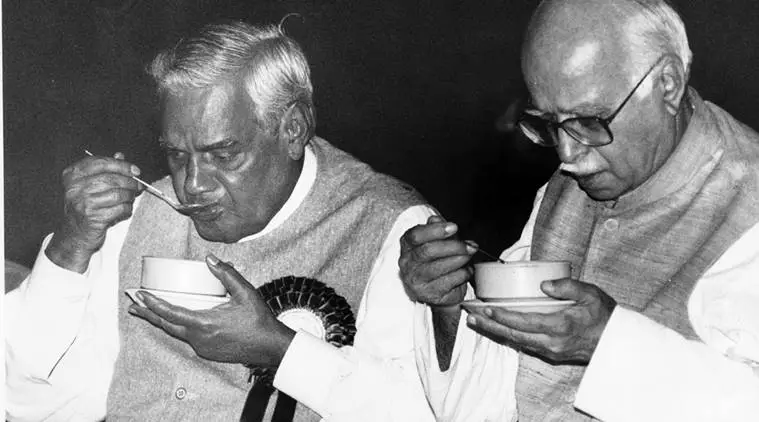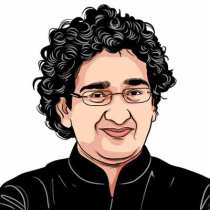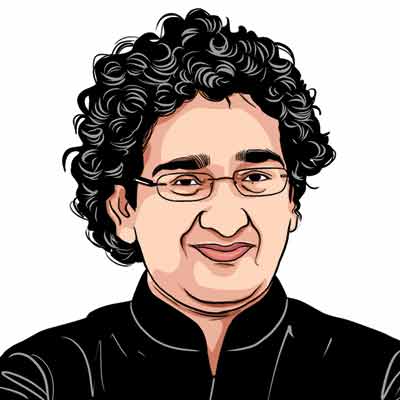Liberal and nationalist
Vajpayee’s persona was shaped by LK Advani, Rajkumari Kaul and Parliament.

Atal Bihari Vajpayee and LK Advani. (Express archive photo by Mohan Bane)
The many obituaries being written about Atal Bihari Vajpayee will reveal aspects of his greatness: His eloquence, his leadership of the country, his geniality. As we celebrate the man, perhaps some thanks are due to the three influences that shaped him more than any other: L K Advani, Rajkumari Kaul and the Indian Parliament.
Vajpayee and Advani got to know each other well in 1957, when Deendayal Upadhyaya — who swiftly identified Vajpayee as an orator and Advani as an organiser — shifted Advani from grass roots work in Rajasthan to become the new MP Vajpayee’s secretary. It is a measure of Advani’s loyalty that he never forgot this original hierarchy. It was Vajpayee who had initially lifted Advani’s career. In 1973, Vajpayee overlooked senior leaders to ensure that a Advani replaced him as Jana Sangh president. Advani’s career never looked back, and between him and Vajpayee, they kept the presidency of the Jana Sangh and then BJP for virtually the next 25 years.
Advani returned the favour in 1995. By then, Vajpayee had been discarded by his party, given titular respect but no real powers. Vajpayee’s sin was that he had crafted the early BJP as a secular, socialist legatee of the Janata party; he had also opposed the Ayodhya movement. It was Advani who was the RSS’s choice for PM for the 1996 elections. But in November 1995 in Bombay, Advani announced Vajpayee as the prime ministerial candidate — to the astonishment of those on stage, and dismay of the RSS. From then on, Vajpayee could not be toppled — becoming prime minister in 1996, 1998, and in 1999 — while Advani withdrew to number two.
The other, intense, influence on Vajpayee was Rajkumari Kaul. They met first in 1941, when both were studying in the same college in Gwalior. There might have been love, but it didn’t go anywhere. They met again in 1957, city and circumstances changed. Vajpayee was now an MP with promise. Kaul was married to a professor of philosophy. From then on, Vajpayee, Mr and Mrs Kaul (along with their children) would become one family.
Before he met the Kauls, Vajpayee was of a type typical to Hindu nationalism: A patriarchal lower middle-class man suspicious of English and the West. It was Rajkumari who softened him. She was a well-read Nehruvian liberal who lived in an academic milieu. A BJP leader who is also a family friend remembers witnessing long conversations between Rajkumari Kaul and Vajpayee on the Babri Masjid. Another BJP leader adds: “If anyone had a problem with Vajpayee, if he was rude or anything. Mrs. Kaul would calm things… Without her, he was nothing.” If Vajpayee’s instincts ended up liberal while working within the four corners of Hindu nationalism, it is Rajkumari Kaul that India must thank.
When the 34-year-old Vajpayee became a Lok Sabha MP in 1957, he was also made head of his party in Parliament. He continued in this position (either through the Lok or Rajya Sabha) from 1957 to 2004, practically uninterrupted. When he was briefly denied the post in the Lok Sabha Leader of Opposition from 1991 to 1993 by the RSS, he told his aide, “It’s like a knife has cut my throat”. More than any other audience, he cared what Parliament thought of him and his. Vajpayee’s India was the Central Hall of Parliament.
While Vajpayee was able to balance party and Parliament, on the occasion he felt unsteady, he would resort to the following dynamic: Vajpayee’s first reaction to any provocation would be “liberal”. But if he sensed that his party’s radicalism was leaving him behind, he would outflank them on the right. Vajpayee had opposed the VHP-RSS support to the Ayodhya movement from 1984 itself, telling a friend: “We should never let sadhus into Parliament”. But he came to realise that the movement had transformed the BJP’s electoral fortunes and ensured his irrelevance in Parliament. On the eve of the Babri demolition, he gave a speech in Lucknow saying “the ground has to be leveled” of “sharp stones”.
Vajpayee will be remembered for his tolerance, humour, and large-heartedness. He will also be evoked for balancing two ideas of India — the Nehruvian liberal and Hindu nationalist. And he was able to do this because he became a bit of both himself.
Sitapati is the author of Half-Lion: How Narasimha Rao Transformed India. He is writing a book on the BJP before Modi
For all the latest Opinion News, download Indian Express App
More From Vinay Sitapati
- Loneliness of Asma JahangirAsma’s loneliness reflected the place that civil society — even the incremental, bourgeois variety — had in Pakistan. In most other countries, what she did…
- A Patriot And A GentlemanNaresh Chandra underplayed his role in nuclear programme, economic liberalisation. ..
- The right skills at the right time: why politicians flocked to ChandraswamiBy the 1980s, Chandraswami had rebranded himself as an international guru...








































No hay comentarios:
Publicar un comentario